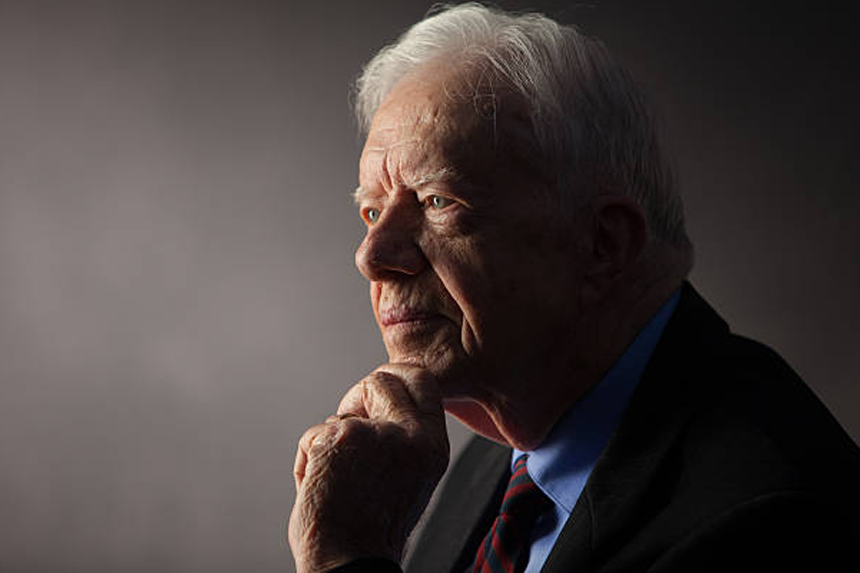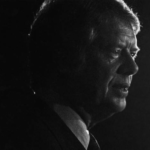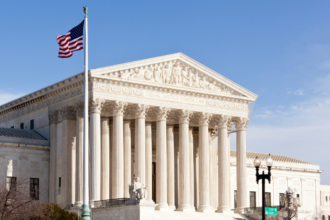Jimmy Carter, the Nobel Peace Prize winner and 39th President of the United States, died Sunday afternoon at his Plains, Georgia, home at 100. Since learning of his passing, leaders from all political parties worldwide have paid their respects in spades.
President Joe Biden characterized Carter as “a man of principle, faith, and humility.” Biden and First Lady Jill Biden made an emotional statement: “Today, America and the world lost an extraordinary leader, statesman, and humanitarian.”
“To all of the young people in this country and to anyone who is looking for what it means to live a life of meaning and purpose — the good life — study Jimmy Carter,” Biden continued. He demonstrated that we are a great country and wonderful people: honorable and decent, brave and kind, modest and powerful.
How Is Carter Being Mourned in America and Around the World?
On January 9, President Biden declared a national day of mourning and urged people to “pay homage” to Carter by going to places of worship. For 30 days, flags at military and public facilities will be flown at half-mast.
Carter was also honored by former President Donald Trump, who had tense relations with Carter in the past. “The difficulties Jimmy faced as president came at a critical moment for our nation, and he did everything in his power to improve the lives of all Americans,” Trump said on Truth Social. We all owe him a debt of appreciation for that.
World leaders echoed them: French President Emmanuel Macron hailed Carter as “a steadfast advocate for the rights of the most vulnerable and a tireless fighter for peace.” Ukrainian President Volodymyr Zelensky praised Carter’s values: “His heart stood firmly with us in our ongoing fight for freedom. ” King Charles III recalled Carter’s “dedication and humility,” fondly recalled his 1977 visit to the United Kingdom.
What Were Carter's Presidency's Challenges and Achievements?
Jimmy Carter became President in 1977 after rising from modest origins as a peanut farmer in Georgia. Economic setbacks and foreign policy obstacles, such as the hostage situation in Iran, characterized his term. However, his government also accomplished important firsts, such as the 1978 Camp David Accords, a historic peace deal between Egypt and Israel.
Carter made a lasting impact on American and international affairs even though he lost the 1980 election to Ronald Reagan by a wide margin. One of Carter’s quotes from his administration was, “I have always believed that our greatness lies not in our power but in our character.”
In what ways did Carter redefine life after the presidency?
After leaving office, Carter became the first American President to live full-time in the modest two-bedroom ranch-style home he had occupied before entering politics. Carter turned down lucrative book offers and speaking engagements in favor of humanitarian activity.
In 1982, he established the Carter Centre to address worldwide concerns about disease, injustice, and human rights. In 2002, he was awarded the Nobel Peace Prize for this work. Together with Nelson Mandela, Carter founded The Elders, an organization of world leaders dedicated to justice and peace.
How Much of a Role Did Faith and Family Play in Carter's Life?
Carter’s four children, eleven grandchildren, and fourteen great-grandchildren survive him. Rosalynn, his wife of 77 years, died in November 2023. His son, Chip Carter, calls his father “a hero, not only to me but to everyone who believes in peace, human rights, and unselfish love.”
Because of his strong religious convictions, Carter continued to teach Sunday school at Plains’ Maranatha Baptist Church far into his 90s. After considering this, Obama said, “He taught all of us what it means to live a life of grace, dignity, justice, and service.”
“President Carter will never be far away,” Obama added, noting that Carter will be buried alongside Rosalynn under a willow tree near their home in Plains.
What Will People Remember About Carter?
Bill and Hillary Clinton said in their tribute, “President Carter lived to serve others — until the very end.”
Jimmy Carter left a legacy of tenacity, modesty, and dedication to improving the globe. His journey from a Georgia peanut farmer to a Nobel Peace Prize winner proves the strength of humanity and service. His memory continues to be a source of inspiration and optimism even as the world laments his departure.








